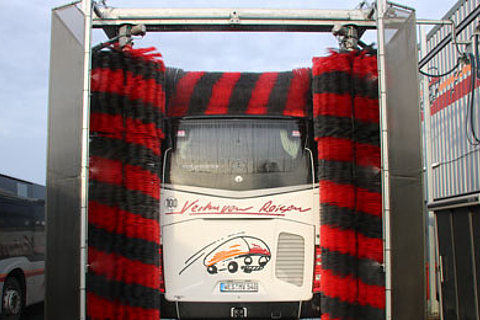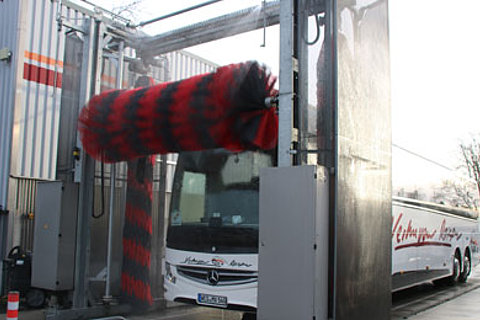
Service
+44 1371 878 802
14a Oak Industrial Park
Chelmsford Road
Great Dunmow
Essex CM6 1XN
Phone: +44 1371 878 800


The high investment costs deter many fleet owners from setting up a gantry car wash on their yard. A six-figure sum has to be raised for this, and even more if a wash bay has to be built. Some prefer to work with an inexpensive mobile device or pressure washers. But washing by hand is both labour-intensive and time-consuming. Others therefore prefer to get their vehicles washed by public valeting companies.
But even then the long-term costs are not negligible. Depending on the valeter and discount scales, the net price for a simple bus wash is usually between 20 and 40 euros for solo or articulated buses. Special additional services such as underbody washing, extra spraying or high-pressure washing are not even included.
If you would like to have your fleet of ten buses, for example, washed at least once a week – after all, the clean appearance of your vehicles serves as an advertisement for the company – you will quickly arrive at an annual sum of 20,000 to 40,000 euros just for bus washing. So it is worth considering setting up your own gantry car wash with all the investment and ongoing running costs, but which will eventually pay for itself.
But when does such a system pay off and what do you have to consider when purchasing it? We checked with a bus company who ought to know. This is because shortly before Christmas 2018, Verhuven Reisen GmbH took a three-brush gantry system into service at its main depot in Xanten. Before purchasing the WashTec MaxiWash Vario type 6-0705, Senior Managing Director Theo Verhuven pulled out his sharp pencil and did the maths (see box "Cost comparison"). His list includes all running costs from depreciation to water consumption and disposal, electricity and provisions for maintenance and repair of the system.
The item 'water and waste disposal' costs a good 3 euros per solo bus (net amounts). The depreciation of the bus wash bought for around €150,000 must be factored in by the same amount per wash. With maintenance and electricity usage, the cost of washing a solo bus adds up to 8.22 euros. For articulated buses, of which Verhuven currently has 19 in its fleet (see box "Portrait"), the sum is 10.22 euros due to the higher water consumption.
This is all calculated conservatively. After a good year of operation, the system had not been down for a single hour due to a technical problem. This is also due to the fact that the bearings of the brush infeed and rotary drives are virtually maintenance-free – which also saves time-consuming lubrication work. There is also less maintenance required for the roof brush suspension due to the flat belt. The robust rack for the side brushes infeed also does not require any maintenance. The frequency converters also allow infinitely adjustable washing speeds. This reduces the load on bearings and motors.
Rico Frerix, workshop manager of the Xanten-based company, also assures us that, should the worst come to the worst, service personnel would be on site quickly with the necessary spare parts and the repair work would be completed within 24 hours at the latest. In addition, the depreciation period of ten years for Verhuven is relatively short. Operators of large vehicle wash centres assume that such gantry washing systems can be in use for at least 17 years before they need to be replaced.
Water consumption is also set relatively high in Theo Verhuven's calculation. In practice, much less precious water is needed, which is listed in Verhuven's sample calculation as 500 l per solo bus. This is ensured on the one hand by the appropriately adjusted pressure limiting valve for the water flow. Secondly, the respective vehicle is first cleaned at the front before the brushes clean the sides and finally the rear. The Xanten bus company has saved on the second wash pass back to the front again – and thus a quarter of the water. This means that only around 375 l are required, and the entire cleaning process of a solo is reduced to less than five minutes.
In general, washing using a gantry system at Verhuven is much less time-consuming than before, when the buses were cleaned with a mobile device. The MaxiWash Vario operator terminal light is already set up so that the drivers can start the process themselves without any problems. The mirror bypass has also already been programmed. Even with high-pressure pre-treatment of 'problem areas' such as the wheel rims and wheel arches, hardly more than ten minutes per bus are required.
55 to 60 washes per day – slightly fewer in summer – can be done in this way. This is considerably more than senior boss Theo Verhuven used as a basis in his cautiously conservative model calculation before purchasing the gantry system. This means that around 15,000 washes are carried out each year, which further improves the efficiency of the system.
The bus fleet of 99 units also includes the coaches used for FlixBus on the Freiburg-Amsterdam and Düsseldorf-Antwerp routes. However, the majority of the vehicles are 12 and 18 m city buses. In addition, company-owned vans and cars are also cleaned using the gantry system.
Mainly water, shampoo and drying agents are used. There is a dosing pump for the shampoo. Slightly firmer brushes are designed to ensure good cleaning results. The system is the stainless steel version of the MaxiWash Vario – simply because it is installed outdoors. Verhuven has done without a washing bay as well as water conditioning, as this would have required more extensive construction measures and the installation of special treatment tanks.
Even if the waste water charges are higher, the use of the company's own gantry system means that in the end there is a clear plus compared to using a valeting service. That would cost around 22 euros for solos and 33 euros for articulated buses. The savings are around 14 euros for 12 m and 23 euros for 18 m buses.
Text/ pictures: Claus Bünnagel, busplaner 1/2020